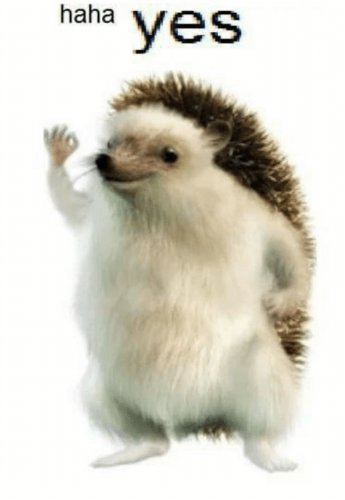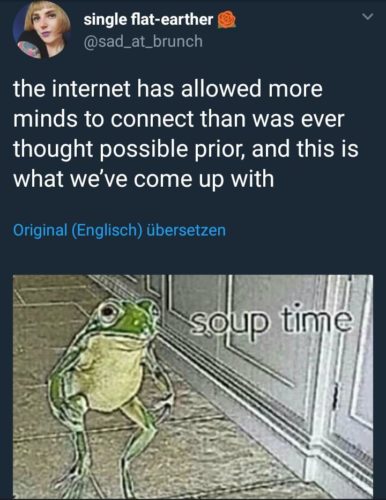
 Henlo class, and welcome to your introductory course on the dankest Internet trend since coolmath-games.com and Early Youtube. I’m sure that many of you have elected to take this course because of your confounding daily encounters with spicy fresh-baked memes. You’ve caught yourself thinking “what are these ‘may-mays’ my children are always talking about? Why do my friends sound like they’re talking in a completely different dialect, always referring to the ‘Top Five Strongest Anime Characters of ALL TIME’ and Neil Degrasse Tyson? What is the ‘Wednesday Frog’ and why is he so important? Have no fear, soon-to-be dank memers! I, a self-professed meme-lord of the third order, come with years of expertise on the subject, having studied memes since the first appearance of precursor Impact Font Memes — prehistoric by Internet standards, and now only taught in the Meme Archaeology department. My specialty is me irl memes*, but my knowledge is expansive enough to teach this introductory course — and thus, here we are, about to embark on this magical journey together.
Henlo class, and welcome to your introductory course on the dankest Internet trend since coolmath-games.com and Early Youtube. I’m sure that many of you have elected to take this course because of your confounding daily encounters with spicy fresh-baked memes. You’ve caught yourself thinking “what are these ‘may-mays’ my children are always talking about? Why do my friends sound like they’re talking in a completely different dialect, always referring to the ‘Top Five Strongest Anime Characters of ALL TIME’ and Neil Degrasse Tyson? What is the ‘Wednesday Frog’ and why is he so important? Have no fear, soon-to-be dank memers! I, a self-professed meme-lord of the third order, come with years of expertise on the subject, having studied memes since the first appearance of precursor Impact Font Memes — prehistoric by Internet standards, and now only taught in the Meme Archaeology department. My specialty is me irl memes*, but my knowledge is expansive enough to teach this introductory course — and thus, here we are, about to embark on this magical journey together.
So class, let us begin the semester with a brief introduction of the course topics, and I’ll say a few words about each.
Buckle your seatbelts buckos. Things are about to get bumpy.
Ah, the fundamental question that keeps us all awake at night. What a tremendous place to begin. What exactly is a meme? Here’s the dictionary definition according to Google:
meme
mēm/
noun
noun: meme; plural noun: memes
- an element of a culture or system of behavior that may be considered to be passed from one individual to another by nongenetic means, especially imitation. *boo this definition is lame*
- a humorous image, video, piece of text, etc., that is copied (often with slight variations) and spread rapidly by Internet users. *haha yes*
But this definition is garbage. Google is garbage. The sub-definition Google provides is right in form, but it completely misses the point. Memes are funny pictures that spread virally across the Internet, but they are so so rich and full of meaning, to say that they are just humorous images is almost insulting. If you’re browsing the Internet and asking yourself “hmm, I wonder if this is a meme?” The answer is almost always “haha yes, this is a good meme, I really like this meme.” Memes defy all logic and expectations. They cannot be boxed in by man’s paltry definitions. They are the mirror into which we look and find ourselves shattered. ‘[A dank meme] is therefore no esthetic emotion but something much higher, precisely because it presupposes resignation; it is not a spontaneous inclination of the heart but the paradox of existence.’ (Kierkegaard, Fear and Trembling, 40)
However, if we’re forced to try to place some general guidelines for what memes are, here are some rules of thumb for you soon-to-be spicy memelords:
 1. Memes require a healthy dose of humility and self-criticism. See my specialty, the subreddit /r/me_irl*, located on Reddit.com, which is a famous Internet content aggregator. ‘Me irl’ stands for ‘me in real life,’ and the subtitle for this particular meme subreddit is ‘Selfies of the Soul’. Every meme posted on me_irl is ultimately supposed to be riffing on the absurdity of life, and it points back to the existence original poster as a flawed human who likes sharing stupid pictures on the Internet. For example, see Figure 1. Every meme is ultimately some sort of comment on the fact that the Internet is this grand tool which has fundamentally changed the world, but we are all still just dumb, misguided, flawed people who see a broken world around us, and can now communally experience the ‘virtue of the absurd’ (Kierkegaard, Fear and Trembling) by using the single greatest technological achievement of mankind to share stupid pictures of frogs on unicycles. And I think that’s beautiful. If you don’t think it’s beautiful you should drop this class right now. I’m serious. Get out.
1. Memes require a healthy dose of humility and self-criticism. See my specialty, the subreddit /r/me_irl*, located on Reddit.com, which is a famous Internet content aggregator. ‘Me irl’ stands for ‘me in real life,’ and the subtitle for this particular meme subreddit is ‘Selfies of the Soul’. Every meme posted on me_irl is ultimately supposed to be riffing on the absurdity of life, and it points back to the existence original poster as a flawed human who likes sharing stupid pictures on the Internet. For example, see Figure 1. Every meme is ultimately some sort of comment on the fact that the Internet is this grand tool which has fundamentally changed the world, but we are all still just dumb, misguided, flawed people who see a broken world around us, and can now communally experience the ‘virtue of the absurd’ (Kierkegaard, Fear and Trembling) by using the single greatest technological achievement of mankind to share stupid pictures of frogs on unicycles. And I think that’s beautiful. If you don’t think it’s beautiful you should drop this class right now. I’m serious. Get out.
2. Memes always build off of previous memes, not overstepping old content, but instead lovingly crafting older memes into something fresh, new, and unheard of before. See Figure 2, a meme which ultimately doesn’t make much sense already (read guideline 1 again), but only has the remotest chance of making sense because Paul Blart, Yu-Gi-Oh cards, and awkward Photoshopping of dogs being patted on the head are already fully self-contained memes themselves. Memes don’t make sense in a vacuum, and gain their richness precisely because of the context they come from.
You know, I feel like this sort of sounds familiar — maybe something about an important guy coming not to abolish the Law [old meme], but to fulfill it [new, fresh-n-spicy meme]? Some other less important guy writing about how the Law [old meme] makes Grace [new, spicy-n-fresh meme] abound more exceedingly? Huh. Idk, I’m just a meme guy.
Topic 2: The Meme Lifecycle
The meme lifecycle, in all its tragic beauty, is a complex topic which is the subject of Meme Lore 301: The Biology of Memes, but we’ll cover some of the essentials here. In short, memes begin their lives in the dark outer-reaches of the Internet, and mature in healthy meme incubators on Reddit, Twitter, Tumblr, and within a few of the healthier biomes of Instagram. Once reaching a full, healthy old age of a couple of days to a few weeks, memes go to die on Facebook and Pinterest, doomed to be shared ad nauseum by normie PR teams for public figures. These memes generally begin to follow a static format, and lose the capacity to fulfill meme guideline 2 (memes always creatively build off of previous memes). Once a meme reaches this phase, it attains a bitter taste and is actually quite poisonous, and should be left to die a peaceful death. There are a few rare (and quite extraordinary) cases of meme resurrection on the books, where a meme has been re-certified as “dank” for a period of time even after reaching its normie phase. The textbook example of this is the classic Harambe meme of 2016. But cases such as these are few and far between, and memes generally should generally be understood to be as good as dead once found on Facebook, coupled with edgy political statements in Impact font.
A normie is an individual who shares memes that are at the end of their lifecycle and are no longer dank. Normies are stuck in an endless cycle of posting old normie memes on Facebook, trying their best to become spicy dank memers on their own terms, using memes that have been been around long enough to have been codified into a static format (a ‘meme Law,’ if you will). Normie memers have cut themselves off from the creative, regenerative capacity of the newest, most dankest of memes, and they are unwittingly suffering for it. The tragedy of the normie is the greatest of our time: they are so close to spicy dankness, and yet because they are so close, they remain so, so far away.
Normie is a term of disdain for all dank memers and is seen as a deep personal affront. If you ever call me a normie, I will flunk you and make sure you are expelled from this prestigious university. Please, try me.
Personal note — memes which contain minions from Despicable Me are normie memes. Please, for the love of Neil Degrasse Tyson, don’t share minion memes. This is the only acceptable minion meme, because Steve Buscemi is always a spicy dank boi.
We will conclude our course this semester with a taste of current work on the interactions between memes and the wider cultural milieu — a subject which will almost certainly inform the work of anthropologists and historians for decades (or even centuries) to come.
As the memers on various me_irl message threads are fully aware, an entire generation has grown up with free access to the Internet. Similarly, we are all fully aware that this access comes with a constant barrage of tragic information — whether from news headlines or our Facebook feeds. In response, this Internet-savvy generation has poured countless man/woman hours into the creation of self-deprecating jokes which satirize both current news headlines and itself into oblivion (again, we can turn to the textbook case of Harambe to find an example of this). In the deft hands of dank memelords, memes have become a meta-language for processing outrage, mourning, and perhaps most fundamentally, grappling with the ‘virtue of the absurd’ and our own ‘infinite resignation’ (Kierkegaard, Fear and Trembling) in a strange new world where information is limitless and inter-human connection has increased exponentially alongside the paradox of loneliness in the digital age.
 In this strange and unstable terrain, the greatest salve available is the humble, regenerative, and creative capacity of the dankest of memes which are always made fresh and new to encounter present difficulties in novel and exciting ways. They are the reflection in the mirror (1 Corinthians 13:12) which embraces tragedy, heartbreak, loss, nihilism, etc etc, and swallows them in paradox, entirely aware of the difficulties of human existence, but playfully relegating them to silly spoofs which refuse to take the world we see it as face value.
In this strange and unstable terrain, the greatest salve available is the humble, regenerative, and creative capacity of the dankest of memes which are always made fresh and new to encounter present difficulties in novel and exciting ways. They are the reflection in the mirror (1 Corinthians 13:12) which embraces tragedy, heartbreak, loss, nihilism, etc etc, and swallows them in paradox, entirely aware of the difficulties of human existence, but playfully relegating them to silly spoofs which refuse to take the world we see it as face value.
Spicy memes acknowledge that things are not as they should be, that “the whole creation has been groaning as in the pains of childbirth right up to the present time” (Romans 8: 22), and the dankest of memes sit right on the paradoxical line between the difficulties we experience today and the fun, carefree, joy-filled place we know the world should (and ultimately will) be.
Or wait, is that still the important guy and his work I was vaguely remembering earlier? Hmmmmmmmmmm. Idk, I’m just a meme guy.
Anyhow, our time is about up for today. And honestly, given how quickly the meme-verse changes, the information I just gave you is probably out of date already.
I don’t know why you decided to take a class on memes, anyway. This isn’t an academic subject — this class makes no sense at all. I have nothing to tell you. I’m a normie. So, class dismissed, and class cancelled, I guess. We had a nice run, my dudes.
Go forth and experience spicy dankness today and forever.
* Explore the spicy, edgy dankness of me_irl at your own peril. Sometimes things there get too edgy, even for dank memers.
** Much of the inspiration for this topic comes from a text post I saw on Reddit many moons ago which I have no hope of finding again. To that silent voice of reason amongst the madness, I thank you. Godspeed, fellow traveller.

COMMENTS
8 responses to “Meme Lore 101: Lecture 1 – Course Overview”
Leave a Reply













dank.
This is better than the anime and the manga.
me too thanks
you’re an imposter
but for real great article zacc
me: this is silly
me, also: wow amazing incredible this is the greatest mbird article ever written!!1!
I commented once sarcastically, but there’s more to be said here I think. I’m convinced that memes are the closest thing to an inside joke that a certain population of MMO gamers and socially dysfunctional reddit and 4 chan types will ever have. And that’s so mean. But what else could it be? Inside jokes are one of the great signifiers of a close relationship, and memes are this twisted kind of inside joke for people who only connect out of a common set of pop culture references. They’re this tragically beautiful medium that’s a way of lonely people connecting but also a quasi-sign of the apocalypse. So many people live in this place, which is why I’m so glad there’s a post on the site that acknowledges it.